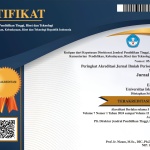The Arrangement Unus Testis Nullus Testis in Sexual Violence Crime Cases: Crucial or Over-Regulation?
Abstract
The principle unus testis nullus testis is a fundamental evidentiary rule in Indonesian criminal procedure, requiring at least two valid pieces of evidence to convict a defendant. This principle aligns with the negative legal system approach, emphasizing judicial certainty in criminal trials. However, its strict application in cases of sexual violence presents challenges, as these crimes often occur in closed settings where the victim is the sole witness. Recognizing this, Law No. 12 of 2022 on Sexual Violence Crimes introduces a provision that allows a victim's testimony, supported by at least one other piece of evidence, to be sufficient for conviction. This study examines the normative conflict between Article 25(1) of Law No. 12 of 2022 and Article 185(2) KUHAP, which traditionally enforces the unus testis nullus testis principle. By employing a normative juridical approach, this research analyzes the necessity and implications of this special provision, comparing its application with Dutch legal practice, where courts allow supporting evidence beyond direct witness testimony (steunbewijs). The findings suggest that while special considerations for sexual violence cases are justified, Article 25(1) of Law No. 12 of 2022 may constitute over-regulation, as its substance is already accommodated within the existing evidentiary framework of the KUHAP. This research highlights the need for harmonization between special provisions on sexual violence cases and general evidentiary rules to ensure legal certainty while upholding justice for victims. Future legislative reforms should focus on integrating these provisions systematically to prevent redundancy and inconsistencies within Indonesia’s criminal justice system.
Keywords
Full Text:
PDFReferences
Adamczewski, Karol Krystian. (2023). ‘Moral Certainty of the Judge in the Canonical Process to Determine the Nullity of Marriage v. the Principle Testis Unus Testis Nullus’. Religions 14, no. 3, https://doi.org/10.3390/rel14030405,
———. (2024). ‘St. Isidore of Seville on the Role and Importance of Witnesses’. Acta Iuris Stetinensis 49, no. 9: 9–21. https://doi.org/10.18276/ais.2024.49-01,
Adamczewski, O. Karol. (2019). ‘Testis Unus Testis Nullus – the Testimony of Saint Ambrose’. Studia Prawnicze KUL, no. 4. https://doi.org/10.31743/sp.10616,
Akhmadi, Riyanto S. (2018). ‘Penerapan Asas Unus Testis Nullus Testis Dalam Pasal 55 Undang-Undang Nomor 23 Tahun 2004 Tentang Penghapusan Kekerasan Dalam Rumah Tangga’. Wacana Paramarta: Jurnal Ilmu Hukum, no. ISSN-p 1412–4793, ISSN-e 2684–7434,
Ballin, Marianne Hirsch. (2021). ‘Waarheidsvinding Bij de Opsporing En Vervolging van Internationale Misdrijven’. In In Onderlinge Samenhang: Liber Amicorum Tineke Cleiren, edited by J Altena, J Cnossen, J Crijns, P Schuyt, and J ten Voorde, 719–37. Leiden: Boom juridisch,
Borgers, M. J. (2015). ‘Case Note: Hoge Raad (Unus Testis, Nullus Testis IV), No. 488, No. ECLI:NL:HR:2015:1817, Jul 07, Nederlandse Jurisprudentie, 2015. https://research.vu.nl/files/1368576/NJ.2015.488.pdf,
Chiodi, Giovanni. (2017). ‘Ad Praesumptionem or Ad Plenam Fidem? The Probative Value of the Accomplice’s Testimony in Medieval Canon Law’. Italian Review of Legal History 2–17, no. 2: 1–37. https://boa.unimib.it/handle/10281/157346,
Chitta Dewi, Ni Made Yulia, A.A. Sagung Laksmi Dewi, and Luh Putu Suryani. (2021). ‘Asas Unus Testis Nullus Testis Dalam Tindak Pidana Pemerkosaan Anak’. Jurnal Konstruksi Hukum 2, no. 1 https://doi.org/10.22225/jkh.2.1.2993.191-195,
Dreissen, W. H. B. (2023). ‘De Leemte in Onze Bewijsregeling’. Open Universiteit, https://research.ou.nl/files/65507114/Oratieboekje_-_inhoud_en_omslag_digitaal.pdf,
Fellmeth, Aaron X., and Maurice Horwitz. (2022). Guide to Latin in International Law. Oxford University Press,
Indraguna, Henry, and Faisal Santiago. (2021). ‘The Effectiveness of Confiscation of Criminal Assets in Fair Law Enforcement’. Journal of Legal, Ethical and Regulatory Issues 24, no. Special Issue 1,
Joseph, Brian D. (2022). ‘What’s in a Name? Historical Linguistics and the Macedonia Name Issue’, https://u.osu.edu/bdjoseph/files/2021/07/283-MacNameIssueFINAL.pdf,
Kusnadi, Sekaring Ayumeida, Andy Usmina Wijaya, and Fifin Dwi Purwaningtyas. (2022). ‘Kekuatan Pembuktian Satu Saksi Dalam Tindak Pidana Perdagangan Orang: Antara Kepastian Hukum Dan Tantangan Pembuktian’. Wijaya Putra Law Review 1, no. 1 https://doi.org/10.38156/wplr.v1i1.64,
Leppink, Jimmie. (2017). ‘Evaluating the Strength of Evidence in Research and Education: The Theory of Anchored Narratives’. Journal of Taibah University Medical Sciences 12, no. 4, https://doi.org/10.1016/j.jtumed.2017.01.002,
Leppink, Jimmie, and Patricia Pérez-Fuster. (2016). ‘What Is Science without Replication?’ Perspectives on Medical Education, https://doi.org/10.1007/s40037-016-0307-z,
Mensah, Ebenezer Kojo Gyesi. (2024). ‘Examining the Impact of False Confessions and Wrongful Convictions on Criminal Justice Reform’. Available at SSRN 4813186, https://papers.ssrn.com/sol3/Delivery.cfm?abstractid=4813186,
Miller, Rosalind, Francis Wafula, Chima A. Onoka, Prasanna Saligram, Anita Musiega, Dosila Ogira, Ikedichi Okpani, et al. (2021). ‘When Technology Precedes Regulation: The Challenges and Opportunities of e-Pharmacy in Low-Income and Middle-Income Countries’. BMJ Global Health 6, no. 5 https://doi.org/10.1136/bmjgh-2021-005405,
Monaghan, Jake. (2022). ‘Limits of Instrumental Proceduralism’. Journal of Ethics and Social Philosophy 22, no. 1, https://doi.org/10.26556/jesp.v22i1.1518,
Neculcea, Marius, and Bogdan Ionescu. (2017). ‘Testimonial Evidence. Perspectives and Confluences’. Journal of Legal Studies 19, no. 33 https://doi.org/10.1515/jles-2017-0005,
Rotolo, Antonino, and Giovanni Sartor. (2023). ‘Argumentation and Explanation in the Law’. Frontiers in Artificial Intelligence 6, https://doi.org/10.3389/frai.2023.1130559,
Summers, Sarah Jane. (2023). ‘The Epistemic Ambitions of the Criminal Trial: Truth, Proof, and Rights’. Quaestio Facti. Revista Internacional Sobre Razonamiento Probatorio 4, no. 1, https://doi.org/10.33115/udg_bib/qf.i1.22809,
Tičar, Dr.Sc. Bojan. (2012). ‘Legal Order and the Principles of Law: Case of the Republic of Slovenia’. ILIRIA International Review 2, no. 2 https://doi.org/10.21113/iir.v2i2.142,
Verdult, Kiki. (2024). ‘De Modus Operandi in Een Schakelbewijsconstructie: De Gelijksoortigheid van Het Ongelijksoortige’. Tilburg University,
Wagensveld, Y.F. (2021). ‘Deepfakes in Het Licht van Het Huidige En Gemoderniseerde Bewijsrecht Een Onderzoek Naar de Mogelijke Lacunes Binnen Het Strafrechtelijk Bewijsrecht Ten Aanzien van Deepfakes’. Tilburg University, https://arno.uvt.nl/show.cgi?fid=156328,
Wells, Bruce. (2015). ‘Testimony and Witness’. In The Oxford Encyclopedia of the Bible and Law$ The Oxford Encyclopedia of the Bible and Law, edited by Brent A. Strawn. Oxford University Press,
Zorzetto, Silvia. (2012). ‘The Lex Specialis Principle and Its Uses in Legal Argumentation. An Analytical Inquire’. Eunomía. Revista En Cultura de La Legalidad 3: 61–87. https://e-revistas.uc3m.es/index.php/EUNOM/article/view/2093.
DOI: https://dx.doi.org/10.30659/jdh.v8i1.44613
Refbacks
- There are currently no refbacks.
View My Stats

This work is licensed under a Creative Commons Attribution 4.0 International License.
Jurnal Daulat Hukum has been indexed in:

